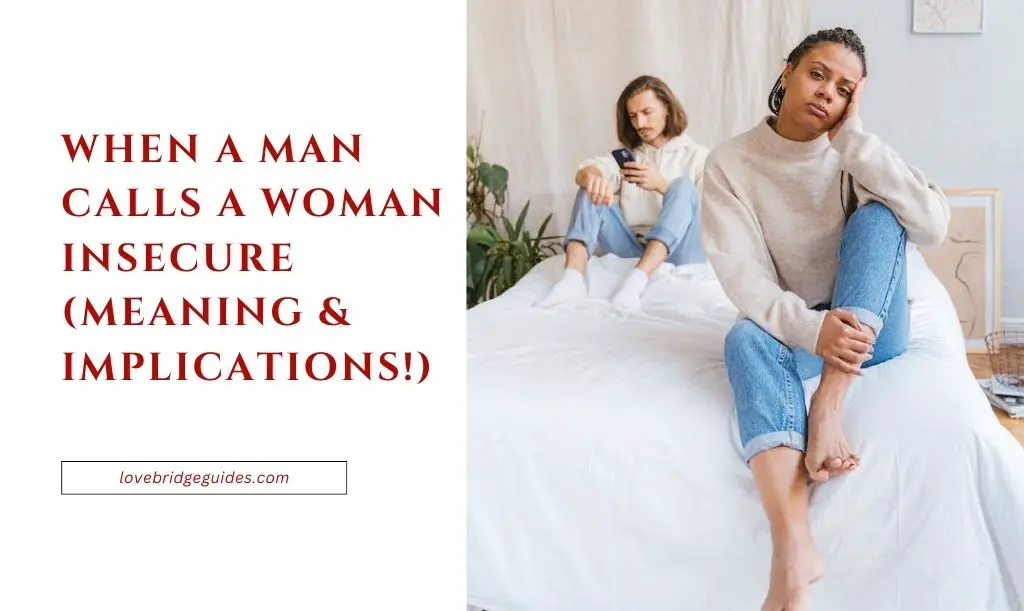In this modern era of supposed progress and gender equality, it is disheartening to witness the persistence of harmful labels imposed on women by men.
One such unjust accusation, frequently hurled with contemptuous intent, is when a man calls a woman insecure. But what does insecurity truly entail?
Is it merely a shallow insult or an opportunity for introspection?
Allow me to delve into the depths of this matter, exploring its multifaceted dimensions and shedding light on the dynamics of interpersonal relationships.
Definition of Insecurity

Insecurity can be defined as a pervasive sense of self-doubt and inadequacy that plagues an individual’s psyche.
It encompasses various manifestations, including but not limited to feelings of worthlessness, fear of rejection, and persistent anxiety about one’s appearance or abilities.
Insecurity often arises from deeply rooted psychological and emotional wounds inflicted by societal expectations, personal experiences, and subjective interpretations.
It is crucial to recognize that insecurity is not solely restricted to one gender; it exists within individuals regardless of their sex or gender identity.
The Dynamics of Interpersonal Relationships
Interpersonal relationships form the intricate web that weaves together human connections.
They are inherently complex entities influenced by countless variables such as trust, communication, compatibility, and mutual understanding.
Insecurities within these relationships can significantly impact the dynamics at play.
When one person labels another as insecure in a derogatory manner, it reveals more about the accuser than the accused.
The power dynamics within relationships often fuel such accusations.
The person hurling these words may seek dominance or control over their partner by eroding their self-esteem.
Moreover, they might project their own insecurities onto their partner in an attempt to deflect attention from their own flaws—a cowardly strategy aimed at preserving their fragile ego.
It is essential to navigate these intricate dynamics with empathy and compassion rather than resorting to name-calling and belittlement.
Furthermore, we must challenge the societal norms that perpetuate insecurity in women and empower individuals to embrace their authentic selves, free from the shackles of arbitrary standards.
Through examining the definition of insecurity and understanding the complexities of interpersonal relationships, we can begin to dismantle harmful stereotypes and foster healthier connections rooted in respect, support, and growth.
Understanding Insecurity in Women

In today’s society, women are bombarded with unrealistic beauty standards that perpetuate feelings of inadequacy and fuel the flames of insecurity.
From glossy magazine covers adorned with airbrushed supermodels to a constant stream of filtered images on social media, the pressure to conform to an unattainable idea of perfection is insidious.
These distorted representations of beauty cultivate a toxic culture that undermines women’s self-esteem and distorts their perception of themselves.
The media plays a significant role in shaping societal expectations, particularly when it comes to body image.
Young girls grow up idolizing impossibly slender figures, convinced that their worth lies solely in their appearance.
They are bombarded with advertisements promoting weight loss products, cosmetic surgeries, and fad diets promising quick fixes for attaining the so-called “perfect” body.
It’s no wonder that many women feel inadequate when they don’t match up to these unattainable standards.
Cultural Norms and Gender Roles: Confined by Stereotypes
Cultural norms and gender roles further exacerbate insecurities in women.
From a young age, girls are conditioned to fit into predetermined boxes defined by society’s narrow perspective on femininity.
They’re expected to be soft-spoken, nurturing caregivers who prioritize others’ needs above their own.
Any deviation from these prescribed roles can evoke judgment and ostracization.
Such rigid expectations limit personal growth and perpetuate feelings of unworthiness among women who dare to challenge these constraints.
Personal Experiences and Upbringing: The Roots of Insecurity
Childhood experiences, particularly traumatic ones, leave lasting imprints on a person’s self-esteem.
Abuse, neglect, bullying, or any form of mistreatment can shatter a child’s sense of worthiness and create deep-seated insecurities.
The wounds inflicted during these formative years often linger into adulthood, with women grappling to overcome the negative narratives ingrained in their minds.
Parental Influence on Confidence Levels: Nurture Shapes Nature
The support and guidance received from parents significantly shape a child’s self-confidence.
When parents constantly criticize or compare their children to others, it plants seeds of doubt that blossom into full-blown insecurities later in life.
On the other hand, parents who encourage their daughters to embrace their unique qualities and teach them resilience foster a strong foundation of self-assuredness.
In understanding the roots of insecurity in women, it becomes evident that societal pressures and expectations as well as personal experiences and upbringing play pivotal roles.
It is crucial to address these factors collectively to empower women to break free from the suffocating grip of insecurity and reclaim their self-worth.
The Male Perspective: When A Man Calls A Woman Insecure

One reason why men often label women as insecure is their own deep-seated insecurities.
Rather than facing their vulnerabilities head-on, they choose to deflect attention away from themselves by pointing out flaws in others.
It’s a cowardly tactic that allows them to avoid confronting their own insecurities and weaknesses.
By projecting these negative feelings onto women, they create a false sense of superiority and mask their own inner turmoil.
Using Insecurity As A Defense Mechanism To Avoid Intimacy
Insecure men sometimes label women as insecure as a way to maintain emotional distance and avoid true intimacy.
Fearful of opening up and being vulnerable, they use this tactic to keep women at arm’s length.
By accusing women of being too insecure, they give themselves an excuse for not fully investing in the relationship or taking responsibility for their emotional baggage.
It’s a manipulative strategy that allows them to protect themselves while shifting the blame onto someone else.
Manipulation Tactics And Power Dynamics
When a man call a woman insecure, it often goes hand in hand with various manipulation tactics and power dynamics within the relationship.
Gaslighting is one such example where men intentionally undermine a woman’s confidence by distorting her perception of reality.
They twist her words, manipulate situations, and sow seeds of doubt in her mind until she questions her every thought and action.
Controlling behavior is another tactic used by insecure men who want to maintain dominance over their partners.
By constantly monitoring the woman’s actions or seeking to isolate her from friends and family, they further fuel her insecurity while reinforcing their control over the relationship.
Signs of Insecurity in Women

Insecurity often manifests itself through various emotional signs in women.
One common sign is a constant need for validation and reassurance.
They seek external approval to compensate for their lack of self-confidence, always doubting their own worthiness.
Additionally, overthinking and excessive worrying take a toll on their emotional well-being, as they constantly second-guess themselves and fear making mistakes or being judged by others.
Behavioral Patterns
Jealousy and possessiveness are common behavioral patterns in insecure women.
Their fear of losing the affection or attention they crave often leads to irrational reactions and the need to tightly control their partner’s actions.
This stems from deep-rooted insecurities that make them question their own desirability.
Another prominent sign is seeking constant approval from others.
Insecure women often rely on external validation to feel good about themselves, seeking reassurance from friends, family, or even strangers.
They struggle with making decisions independently and worry about disappointing others if they don’t live up to expectations.
Nurturing Self-Confidence in Women
To combat insecurity, fostering self-reflection and introspection is crucial.
Women should take the time to identify their personal strengths and accomplishments, recognizing that these define their worth rather than relying on external factors for validation.
Challenging negative self-talk by replacing it with positive affirmations can also help reshape one’s perception of oneself.
Building A Support System
Surrounding oneself with positive influences is vital when nurturing self-confidence.
Having a strong support system of friends, family, or mentors who uplift and encourage personal growth can greatly impact one’s journey towards overcoming insecurities.
Seeking professional help when needed should not be stigmatized either since therapy can provide valuable tools for building resilience.
Empowering Relationships that Combat Insecurity

In relationships, open and honest communication is essential for combating insecurity.
Both partners must create a safe space where they can express their feelings, fears, and insecurities without fear of judgment or retaliation.
Openly discussing vulnerabilities and working together to address them strengthens the bond between partners.
Creating A Safe Nurturing Environment
An empowering relationship fosters a safe and nurturing environment where partners support each other’s personal growth.
This entails celebrating individual achievements, respecting boundaries, and fostering trust.
By providing an atmosphere that encourages self-confidence, both partners can thrive together.
When A Man Calls A Woman Insecure: Conclusion
So, what does it mean when a man calls a woman insecure?
Insecurity in women is often preyed upon by men who project their own vulnerabilities or manipulate power dynamics within relationships.
Recognizing the signs of insecurity allows individuals to address these issues head-on through self-reflection and building a support system.
Empowering relationships based on open communication and creating a safe environment are key to combatting insecurities effectively.
By embracing self-confidence, individuals can break free from the shackles of insecurity and forge healthier connections with others.
It is through this journey towards genuine confidence that one finds true happiness and fulfillment in both personal growth and meaningful relationships.
Related Articles:
- https://lovebridgeguides.com/how-does-a-man-feel-when-a-woman-apologizes/
- https://lovebridgeguides.com/is-being-called-a-unicorn-a-compliment/
- Does A Prom Date Mean Anything? (Answered!) - 20 February 2024
- Boyfriend Refers To Me In Third Person (Explained!) - 20 February 2024
- Is Sending Memes Flirting? Find Out Here! - 20 February 2024

